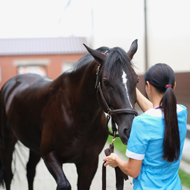Charity rescues horses abandoned in smuggling attempt
One of the horses discovered had to be euthanised.
An animal welfare charity has stepped in to rescue 26 horses, including pregnant mares, which were abandoned at a holding yard in Kent after authorities found they were being smuggled out of the UK.
The horses, only 19 of which had the necessary paperwork, were taken to World Horse Welfare’s Norfolk Rescue and Rehoming Centre.
One of the horses, an elderly mare with severe arthritis, was in such a bad condition that it had to be euthanised. Among the other horses, five mares were found to be pregnant, one of which had laminitis, and a number of the young colts were unhandled.
While in quarantine at the centre, the group was found to be carrying equine influenza, leading to the centre being put into lockdown to minimise the risk of it spreading.
The charity believes that some of horses were being exported to be slaughtered in Europe.
Roly Owers, chief executive of the charity, said: “We applaud the authorities for taking action in this case and stopping the vehicle, but far too often these lorries cross borders unchecked.
“From our initial investigations, the horses were allegedly travelling from the Republic of Ireland to France, using Britain as a land-bridge. But they are all British-born horses with some being bought from sales in England shortly before supposedly being ‘imported’ back into the country.
“Regardless of whether the horses started their journey in Ireland or Britain, it is highly likely that they would have been travelled for hours to potentially end their lives in a European slaughterhouse.”
Legislation to ban the live export of livestock, including equines, for fattening or slaughter is currently before the House of Lords. Welcoming the planned law, World Horse Welfare has called on the government to ensure the ban will be properly enforced.
Mr Owers added: “To put an end to these abhorrent movements and to protect our nation’s horses, it is imperative that the UK government gets the Live Export Bill onto the statute book, finally implements a robust and digitalised equine identification system, and establishes an effective system for enforcing all equine legislation, so that smugglers can no longer hide behind a smokescreen of confusion.”
Image © Shutterstock



 The BEVA has opened two new roles on its Nurse Committee.
The BEVA has opened two new roles on its Nurse Committee.